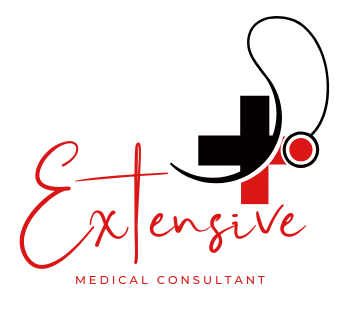Why Accreditation Isn’t Just Paperwork, It’s Patient Protection
In the evolving landscape of healthcare, accreditation is often seen as a checklist activity routine audit, or a temporary sprint toward compliance. But this perception couldn’t be further from the truth.
Accreditation is not just about satisfying regulations or maintaining certifications. It is the backbone of a healthcare facility’s commitment to quality, safety, and operational excellence. When done right, accreditation protects patients, enhances trust, and builds a culture of accountability.
At Extensive Medical Consultant (EMC), we believe accreditation is a critical component of healthcare leadership, not an afterthought. We partner with healthcare organizations to shift the mindset from "checking boxes" to delivering patient-centered, standards-based care every day.
Understanding Healthcare Accreditation
Healthcare accreditation refers to an external review process in which independent accrediting bodies evaluate a healthcare organization’s adherence to industry standards. These standards cover a wide range of essential areas, including patient care, infection control, documentation, facility safety, and leadership effectiveness.
Some of the most recognized accrediting bodies in the United States include:
- The Joint Commission (TJC)
- Accreditation Association for Ambulatory Health Care (AAAHC)
- National Commission on Correctional Health Care (NCCHC)
- American Correctional Association (ACA)
Each of these organizations provides a framework for achieving and maintaining clinical excellence, ensuring that healthcare organizations consistently meet the highest standards of care and compliance.
Why Accreditation Matters Beyond Documentation
While some clinics see accreditation as a paperwork exercise, the real value lies in what those documents represent: systematic protections for patients, providers, and the healthcare system at large.
Key reasons accreditation matters:
1. It Safeguards Patient Safety
The primary goal of accreditation is to reduce risk and harm to patients. Accredited facilities must follow clear, evidence-based protocols for infection prevention, medication management, patient identification, and emergency response of which directly impact clinical outcomes.
2. It Ensures Operational Readiness
Accreditation requires facilities to maintain well-organized policies, proper documentation, trained staff, and continuous quality improvement. This means organizations are always survey-ready, not just reactive to deadlines.
3. It Boosts Provider Accountability
Clear standards promote a culture where leadership, clinicians, and staff are all accountable for delivering safe and ethical care. Accreditation holds teams to measurable benchmarks, helping reduce variability and increase consistency in service delivery.
4. It Strengthens Patient Trust
Patients are increasingly aware of quality ratings, accreditations, and public reporting. Being an accredited facility demonstrates a clinic’s commitment to safety, transparency, and excellence, which in turn builds long-term patient trust.
The Hidden Risks of Treating Accreditation as Paperwork
Failing to understand the strategic importance of accreditation can have serious consequences. Clinics that approach the process superficially often face:
- Deficient documentation during audits
- Non-compliance citations or denied reaccreditation
- Staff confusion over roles and responsibilities
- Increased risk of malpractice or regulatory penalties
- Damage to institutional credibility and patient trust
What begins as an administrative oversight can rapidly evolve into a major operational and legal crisis. This is why every healthcare organization, regardless of size or specialty, must take accreditation seriously.
Accreditation as a Catalyst for Quality Care
At EMC, we help healthcare organizations reframe accreditation not as a burden, but as a strategic investment in quality and safety. The standards set by accrediting bodies are not arbitrary. They are grounded in decades of research, industry best practices, and patient safety data.
When implemented effectively, accreditation standards lead to:
- Reduced healthcare-associated infections
- Fewer medication errors
- Streamlined communication among care teams
- Improved continuity of care
- Stronger emergency preparedness
These outcomes don’t just check regulatory boxes; they save lives.
EMC’s Accreditation Support: Designed for Modern Healthcare
Navigating the accreditation landscape can be overwhelming, especially with evolving regulations, limited staff bandwidth, and multiple operational demands. That’s where Extensive Medical Consultant steps in.
Led by Dr. Scarlett Lusk, our team brings decades of experience in regulatory compliance, accreditation readiness, and clinical operations. We serve healthcare facilities of all types, from ambulatory surgical centers to correctional facilities and private clinics.
Our Accreditation Support Services include:
- Mock surveys that mirror official audit conditions
- Custom policy and procedure development aligned with your accreditor’s standards
- Staff training programs on compliance, patient safety, and survey preparedness
- Corrective action planning for facilities undergoing re-accreditation or citations
- Ongoing consulting to maintain year-round readiness
Whether your organization is preparing for its first accreditation or working to maintain compliance in a post-pandemic world, EMC is your trusted partner.
Adapting to Evolving Standards: 2025 and Beyond
As we move into 2025, the regulatory environment is becoming more stringent and outcomes-driven. Accrediting bodies are placing greater emphasis on:
- Equity and access to care
- Telehealth protocols and digital recordkeeping
- Staff burnout prevention and workplace safety
- Patient-centered communication standards
EMC helps organizations stay ahead of these changes by providing forward-thinking strategies tailored to your facility’s goals, patient population, and care model.
Final Thought: Accreditation Is a Promise to Your Patients
Accreditation is not a destination; it’s a journey of continuous improvement, accountability, and care quality. It is a promise to your patients that they are receiving care in an environment that prioritizes safety, compassion, and excellence.
When you work with EMC, you’re not just preparing for a survey. You’re building a culture of trust that will strengthen every aspect of your organization.
Ready to Elevate Your Accreditation Process?
Let Extensive Medical Consultant guide your clinic toward meaningful, sustainable compliance.
Call us at 346-564-1335
Serving Houston and Beyond















